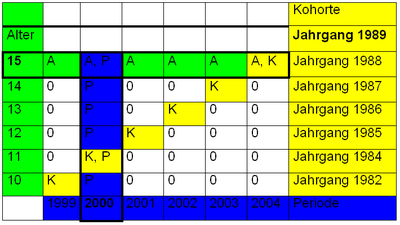Cohort (social science)
In sociology , demography and statistics , cohorts ( Latin: cohors "enclosed space") are groups of people who have jointly experienced a certain long-term formative event. The division into cohorts can serve to delimit population groups. Depending on the starting event, it can be, for example, age or birth cohorts ( generations ), marriage cohorts or cohorts entering the job market. In population science , only birth cohorts are referred to as “cohorts”; B. the year 2003.
A cohort should always relate to a similar cultural environment. Differences that exist between different cohorts and can thus be traced back to the existence of different social and environmental influences are referred to as “cohort effects”.
The staggered cohort technique is an empirical study in which cohorts are examined at recurring time intervals for certain characteristics (e.g. cognitive development). This procedure also enables a comparison with other cohorts (e.g. comparison of certain characteristics of the 1990 cohort with the 1960 cohort).
Cohort strength
The cohort size, the number of members of a cohort, is important e.g. B. in the question of the resilience of the intergenerational contract . Since the cohort of contributors to the pension system loses in recent decades in relation to the cohort of pensioners from strength to strength, increasing financial problems in financing occurred pensions on.
Problems of cohort analysis
Since age, period and cohort effects can occur simultaneously in every event, there is an identification problem with every attempt to empirically assign an event to an effect (Renn, 1987):
- A cross-sectional study keeps period effects constant since all individuals are surveyed at the same time. Every event that occurs in an individual can, however, be the result of both age effects and cohort effects (e.g. do older people have more trust in other people because they are older or because they belong to an older generation?).
- Longitudinal studies focus on a specific cohort that is interviewed at different times. Every event that occurs in an individual can, however, be the result of both age effects and period effects (e.g. is the change in a person's trust a result of their aging or a result of general individualization?).
- Time series studies focus on a specific age group. For example, a group of eighteen-year-olds is examined every year. However, here, too, no clear assignment of period and cohort effects is possible. Any event that occurs in an individual can be triggered by either a period effect or a cohort effect. (e.g .: Are the better grades of school leavers the result of changed educational opportunities for a new cohort or are these effects due to period-specific effects such as a particularly simple final examination?).
See also
literature
- Karl Mannheim : The Problem of Generations . In: Kölner Vierteljahreshefte for sociology . No. 7 , 1928, pp. 157-185, 309-330 .
- Heinz Renn: résumé-lifetime-cohort analysis. In: Wolfgang Voges (Hrsg.): Methods of biography and life course research . Leske + Budrich, Opladen 1987, pp. 261-298.
- Andreas Diekmann : Empirical social research. Basics, methods, applications. (= Rowohlt's Encyclopedia. Volume 551). Rowohlt, Reinbek near Hamburg 1995, ISBN 3-499-55551-4 . (20th, completely revised and expanded edition. (= Rowohlt-Taschenbuch . 55678). 2009, ISBN 978-3-499-55678-4 ).
- Rainer Schnell , Paul B. Hill , Elke Esser: Methods of empirical social research. 10th edition. Oldenbourg, Munich 2013, ISBN 978-3-486-72899-6 .
